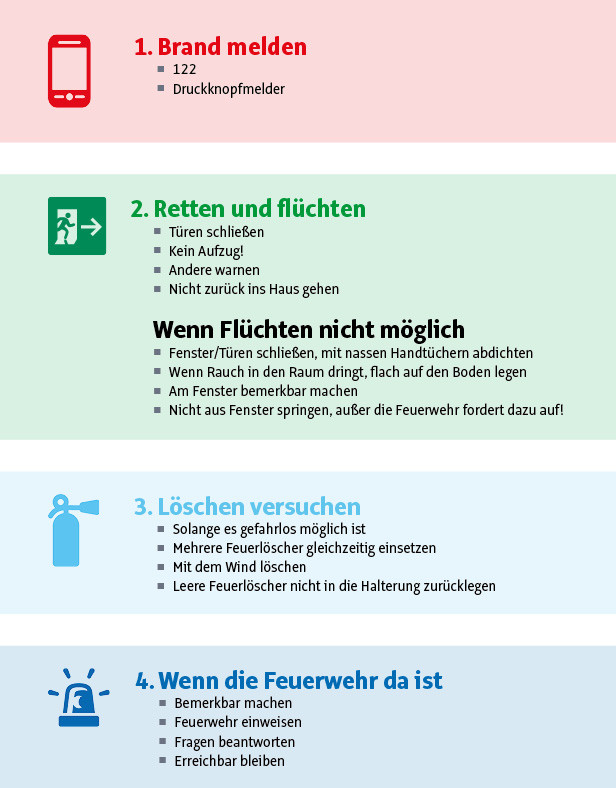Behavior in case of fire
What helps the fire department during fire operations?
- Be sure to follow the instructions of the firefighters.
- Instruct the fire department at the scene of the fire.
- Communicate important information to the fire department.
- How many people are still in the building, missing or in danger?
- Are hazardous materials (gas cylinders, pyrotechnic materials, flammable liquids, chemicals, etc.) involved?
- Do not obstruct fire department access roads or staging areas.
- Keep escape routes and stairwells clear.
How do I extinguish a fire correctly?
- Only extinguish yourself as long as you do not put yourself in danger.
- Fight fires downwind.
- Extinguish from front to back and from bottom to top.
Exception: extinguish dripping and flowing fires from top to bottom. - If people are available, it is better to use several extinguishers at the same time rather than using them one after the other.
- Beware of reignition. Always re-extinguish embers with water.
- If you are not sure about the success of the extinguishing work, or if there are still fire gases in the building, notify the fire department. They have the expertise and the equipment (such as thermal imaging cameras or special extinguishers, gas detectors) to make sure that there is no reignition or that there are still toxic fire gases (mostly invisible and odorless) in the rooms.
- Do not rehang fire extinguishers that have been used; have them refilled.
Attention when extinguishing gas fires (fire class C)! There is a saying among firefighters: Burning gas is safe gas. This means that you should not actually extinguish a gas flame, but only the secondary fires affected by it (other substances that were ignited by the gas flame). The reason is that otherwise gas will escape in an uncontrolled manner and an explosive atmosphere can form very quickly. The best option is always to shut off the gas supply and call the fire department at an early stage.
How do I prevent a fire from spreading?
- Remove combustible objects not yet caught in the fire from the immediate fire area.
- Close all doors behind you when leaving the burning room.
- Keep all doors within the affected fire area closed, especially doors to the stairwell.
- The room affected by the fire must not be ventilated until the fire department is present.
- Shut off all gas and oil lines running in the fire area.
- Immediately close all openings (windows, doors, attic hatches) in buildings endangered by flying sparks or flying fire.
- Keep areas endangered by flying sparks, flying sparks or radiant heat wet.
